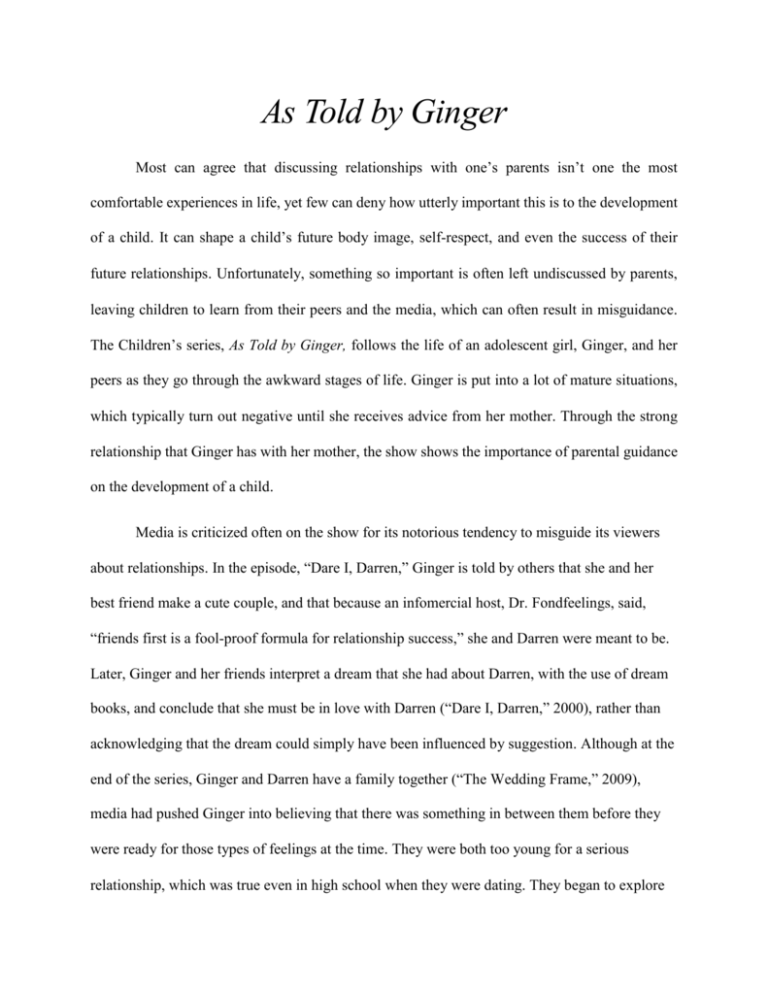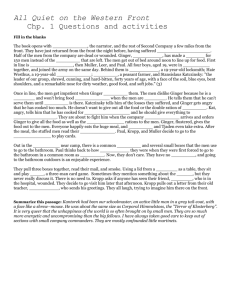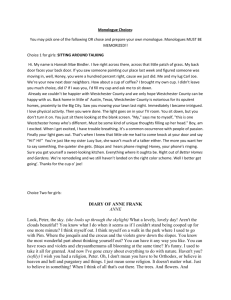Unit 2 paper final ATBG
advertisement

As Told by Ginger Most can agree that discussing relationships with one’s parents isn’t one the most comfortable experiences in life, yet few can deny how utterly important this is to the development of a child. It can shape a child’s future body image, self-respect, and even the success of their future relationships. Unfortunately, something so important is often left undiscussed by parents, leaving children to learn from their peers and the media, which can often result in misguidance. The Children’s series, As Told by Ginger, follows the life of an adolescent girl, Ginger, and her peers as they go through the awkward stages of life. Ginger is put into a lot of mature situations, which typically turn out negative until she receives advice from her mother. Through the strong relationship that Ginger has with her mother, the show shows the importance of parental guidance on the development of a child. Media is criticized often on the show for its notorious tendency to misguide its viewers about relationships. In the episode, “Dare I, Darren,” Ginger is told by others that she and her best friend make a cute couple, and that because an infomercial host, Dr. Fondfeelings, said, “friends first is a fool-proof formula for relationship success,” she and Darren were meant to be. Later, Ginger and her friends interpret a dream that she had about Darren, with the use of dream books, and conclude that she must be in love with Darren (“Dare I, Darren,” 2000), rather than acknowledging that the dream could simply have been influenced by suggestion. Although at the end of the series, Ginger and Darren have a family together (“The Wedding Frame,” 2009), media had pushed Ginger into believing that there was something in between them before they were ready for those types of feelings at the time. They were both too young for a serious relationship, which was true even in high school when they were dating. They began to explore different interests, resulting in a painful breakup between the two. In a later episode, when Ginger develops feelings for Darren again, she is taught by a television talk show to handle her jealousy over his sudden popularity with other girls by giving him the cold shoulder (“Never Can Say Goodbye,” 2002), which is certainly not the proper way to handle jealousy, as it hurt Darren. Lastly, media is present in the episode, “Ms. Foutley’s boys,” where Ginger is convinced by Dr. Fondfeelings that being single will ultimately lead to loneliness and misery (“Ms. Foutley’s Boys,” 2002). The media constantly misguides Ginger when it comes to relationships, showing that it is not always a proper medium through which children should learn about such subjects. Of course, media’s impact on a child’s view of relationships depends on the source. Some forms of media can be useful, but when parents fail to properly address the subject of relationships, children, particularly girls, are extremely vulnerable to the negative influence of certain sources of media. It is also shown how children can be negatively influenced by their peers when making decisions about relationships. In “Dare I, Darren,” It was Miranda and Mipsy that convinced her that her and Darren should date, based on what they had seen on television , showing that children’s peers are often as misguided as they are. They wouldn’t be able to provide useful advice in most cases. Miranda also had her own intentions to make Ginger like Darren so that she would forget about a guy she was also after (“Dare I, Darren,” 2000), showing that dishonest advice can result as a form of manipulation. In the episode, “A fast reputation,” Ginger is constantly made fun of for being a “nice” girl who plays it safe. This pressure leads her to crash a party, where she bumps into a high school boy when looking for her keys that she had lost. Eventually rumors spread that she made out with the guy, and Ginger is called “fast” or, in other words, a slut. She is then shamed by the entire school (“Fast Reputation,” 2002). This response from her peers could have ruined Ginger’s desires to have a relationship in the future out of fear of being thought of as “fast,” but luckily her mother had convinced her that she didn’t need to worry about what others think and the rumors eventually dissipated. Nonetheless, it shows the importance of Lois’s support and involvement in Ginger’s life, because her peers don’t always have the best advice or the best intentions. The show briefly criticizes the education system’s failure to properly educate its students about relationships. In an episode, Ginger and her classmates have to watch a video about the pituitary gland. The video is nothing but an animation of a tap-dancing gland, stating that it secretes the hormones that lead to sexual appeal (“Dare I, Darren,” 2000). It teaches them nothing about anything else, like healthy relationships, resisting pressure to do things they don’t want to do, or positive body image, which are all very relevant issues to the age group the show is directed towards. By showing the minimal effort the school put into educating its students, the show is stating that parents can’t fully entrust the proper education of their children to the school system. While it contributes to their lessons, and not all schools are quite this incompetent, it is still a parent’s responsibility to be involved in discussing such things with their children to ensure they get the information they need. Whenever Lois gives her daughter advice from her own experiences, Gingers worries always seem to vanish. When Ginger comes to believe that women need to be in a relationship to be happy, Lois tells her that “being in a relationship just for the sake of being in a relationship is just plain crazy” and that “you have to let your heart lead the way,” (“Ms. Foutley’s Boys,” 2002). She eliminates the misconception that a woman can’t be happy and strong without a man in her life, which is a misunderstanding that could have led to Ginger placing too much importance into finding a boyfriend, rather than just making herself happy. Her mother also is the reason Ginger was able to finish healing from her break up with Darren. When Darren broke up with Ginger, she began to fear commitment, because she couldn’t let go of him. It wasn’t until her mother told her that she “can’t base [her] feelings on that one experience” and that we’re not meant to “live perfect lives, where we never get hurt” that she was able to move on (“The Wedding Frame,” 2009). Once she was able to accept what had happened, her friendship with Darren had been pieced back together, thanks to her mother. Lois constantly supports Ginger and leads her in the right direction whenever the influence of others points her the wrong way, showing that the best medium of relationship advice comes from parents, and that a strong parent-child relationship is very important. As Told by Ginger serves to remind parents of the importance of their involvement with their children. The audience watches Ginger change from an awkward pre-adolescent to a strong and wonderful young lady, along with all of the confusion, heartbreak, and insecurity she faced along the way. She was able to conquer her obstacles throughout her story with the help of her mother. Through this, we should keep in mind the importance of giving children all they need to know to make informed decisions and feel confident in their relationships, confident that they can trust the person they are with, and not be afraid of getting hurt. Works Cited Criswell, D. (Director), Kapnek, E. (Writer). (2000). Dare I, Darren [Television series episode]. In Klasky-Csupo (production company), As Told by Ginger. Los Angeles, CA: Nickelodeon Animation Studios. Noble, R. (Director), Risley, M. (Director), Kapnek, E. (Writer). (2009). The Wedding Frame [Television series episode]. In Klasky-Csupo (production company), As Told by Ginger. Los Angeles, CA: Nickelodeon Animation Studios. Risley, M. (Supervising Director), Kapnek, E. (Writer). (2002). Never Can Say Goodbye [Television series episode]. In Klasky-Csupo (production company), As Told by Ginger. Los Angeles, CA: Nickelodeon Animation Studios. Risley, M. (Supervising Director), Noble, R. (Director), Kapnek, E. (Writer). (2002). Ms. Foutley’s Boys [Television series episode]. In Klasky-Csupo (production company), As Told by Ginger. Los Angeles, CA: Nickelodeon Animation Studios. Risley, M. (Director), Kapnek, E. (Writer). (2009). A Lesson in Tightropes [Television series episode]. In Klasky-Csupo (production company), As Told by Ginger. Los Angeles, CA: Nickelodeon Animation Studios. Scott, J. III. (Director), Kapnek, E. (Writer). (2002). Fast Reputation [Television series episode]. In Klasky-Csupo (production company), As Told by Ginger. Los Angeles, CA: Nickelodeon Animation Studios.





